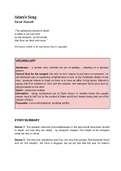Adam’s Song
Derek Walcott
“The adulteress stoned to death
Is killed in our own time
by the whispers, by the breath
that films her flesh with slime.”
(Full poem unable to be reproduced due to copyright)
VOCABULARY
Adulteress - a woman who commits the sin of adultery - cheating on a spouse/
partner.
Horned God for the serpent- the verb ‘to horn’ means ‘to put horns on someone’, an
old fashioned way of explaining unfaithfulness in love. In the Caribbean dialect ‘to the
horn,’ someone means to cheat on them or to have an affair. In this sense, Walcott is
saying that Eve cheated on God with the serpent, she betrayed God’s pure love by
being tempted by the devil.
Vipers - poisonous snakes.
Damnation - being condemned out of God’s favour, in modern terms this usually
means ‘sent to hell’ but in the context of Adam and Eve it means being cast out of the
Garden of Eden.
Peaceable - non-confrontational, avoiding conflict.
STORY/SUMMARY
Stanza 1: The speaker observes that adulteresses in the past would have been stoned
to death, but now they are ‘killed… by whispers’ instead. The breath of the whispers
coats her skin in ‘slime’.
Stanza 2: The first ever adulteress was Eve, the very first woman. She betrayed God’s
love for ‘the serpent’, the Devil in disguise, but we are told that this was ‘for Adam’s
, sake’, to help her husband. Walcott observes the paradox in this story - either we are all
guilty, or Eve is innocent (as are we), because we would have done the same thing in
her position.
Stanza 3: The world is still the same now as it was at the beginning of man’s creation.
Men still sing the same song of despair, when the world of paradise was lost because of
the serpent’s temptation.
Stanza 4: Adam sang this song to Eve, the song is produced as a counter to the
despair of damnation. He sang it when the world was turning to night (this means either
the end of the day, or possibly the end of his time in the world of Eden as he was cast
out into the darkness of the world).
Stanza 5: As darkness descends on the world, the lights of predators’ eyes turn on in
the once peaceful kingdom, and death emerges from the trees (it is thought that Adam
and Eve were immortal before the Fall, so this is their first encounter with the idea of
death).
Stanza 6: There is a shift to the present tense in this stanza. Man sings the song of
Adam still, he’s frightened of God’s jealousy but also his own death, the price of ‘his own
death’ refers to trading eternal happiness and peace for a bite of an apple, which led to
being cast out of Eden.
Stanza 7: The song of man, which has a spiritual element to it, reaches the heavens as
it ‘ascends to God’. God hears it and starts to cry.
Stanza 8: Man’s song says this: “God (directly addressing the ‘Heart’ of God), you are
in my heart as the bird rises on earth in the morning, God, you are in my heart as the
sun sleeps at night, God, you are still within me like water (dew), God, you cry within me
like the weeping rain.”
SPEAKER/VOICE
A speaker is a third-person omniscient narrator who is able to observe the actions of
God and humans impartially, without judgment. We get the feeling that the speaker is
a very passive presence who, like God himself, is only able to watch humans and
their behaviour, without intervening or helping in any way. He seems to feel pity for





